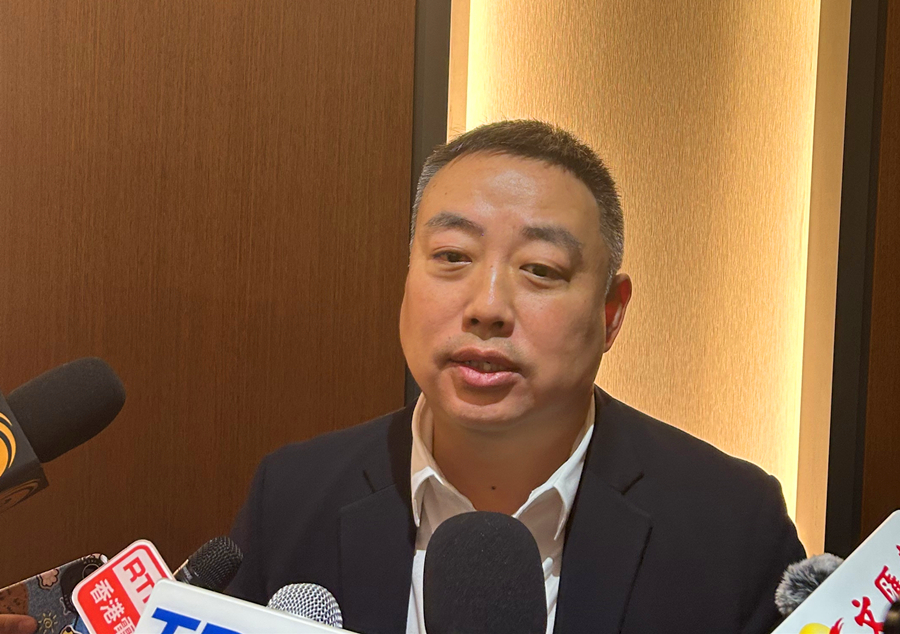
 0 Comment(s)
0 Comment(s) Print
Print E-mail China.org.cn, March 7, 2025
E-mail China.org.cn, March 7, 2025
National political advisor Liu Guoliang, president of the Chinese Table Tennis Association, said they are working to promote the sport to a wider audience in China while addressing challenges faced by the national team.

Liu Guoliang, a renowned former table tennis star and a member of the 14th National Committee of the Chinese People's Political Consultative Conference (CPPCC), speaks to reporters before the opening of the CPPCC session at the Great Hall of the People in Beijing, March 4, 2025. [Photo by Zhang Rui/China.org.cn]
Liu is attending the third session of the 14th National Committee of the Chinese People's Political Consultative Conference (CPPCC) as a member. The session is being held from March 4 to 10.
"I propose bringing the sport into public parks, communities and campuses," he said during a panel discussion on March 6. The initiative aims to expand the sport's grassroots foundation and boost public participation. Liu said last year they made efforts in 16 provinces and municipalities, organizing 183 matches that directly involved over 30,000 players and reached an audience exceeding 500,000 people.
The former Olympic medalist and renowned table tennis star and coach noted the sport's strong grassroots foundation. Events in parks and communities create opportunities for players to foster friendships, he said, as participants are often skilled, familiar with each other and live nearby, allowing regular play.
"I often received video clips from there, and I thought, I might not win against them — even our Olympic medalists couldn't win because they are so good," Liu laughed. "There's a saying in the sport: true talent and genius are often hidden among ordinary people. They play outdoors in public spaces, adapting to different rules and challenging weather conditions. They can even use large wooden paddles to play, while we play indoors in controlled venues."
Liu believes this grassroots enthusiasm will facilitate skill exchange among professionals, amateurs and talented players, expanding the sport's reach and enhancing public enjoyment. He added that promoting table tennis on campuses can increase physical activity, tackle childhood health issues like nearsightedness and obesity, and instill a healthy attitude toward winning and losing.
Table tennis is deeply beloved in China, often called the "national ball." The country has produced many top players who have won Olympic medals and world championships. Liu also offered insights into the current status of Chinese teams and their competitors.
"Japan has always been a strong rival of ours in table tennis," Liu said. "In women's table tennis, the current dynamic remains a competition between China and Japan. Essentially, it's China, Japan and the rest of the world. So, Japan is still fully engaged in competing against China."
He continued, "As for the Japanese men's team, apart from Harimoto Tomokazu, they also have some young players who are gradually improving. However, in the men's field, the dynamic is China versus the world, with Japan being just one part of it. This is essentially the current landscape of world table tennis."
Liu pointed out that professionalization is essential for the global promotion and development of table tennis. However, he emphasized, "It must prioritize the athletes and avoid excessive commercialization, which could harm their professional careers."
This can be seen as an indirect response to the World Table Tennis (WTT) controversy, which arose after China's Olympic champions Ma Long, Chen Meng and Fan Zhendong withdrew from the world rankings at the end of 2024. This was due to WTT's new rules imposing strict penalties for late withdrawals and schedule violations, which many viewed as exploiting athletes.
Liu, who also serves as the chairman of the WTT Board, helped establish the International Table Tennis Federation (ITTF) task force to gather player feedback and review regulations. In February, WTT announced significant rule changes, including the removal of mandatory participation in WTT Grand Smashes, demonstrating its commitment to improving conditions for athletes.
During the CPPCC session, Liu said the Chinese Table Tennis Association will release a "Civilized Spectatorship Initiative" to coordinate efforts among athletes, coaches, referees and security personnel, strengthen venue order management and prioritize players' mental health. The initiative seeks to address disruptive fan behavior, which often sparks online conflicts and cyberbullying, compromising the privacy of public figures.